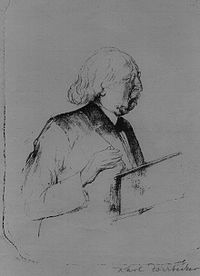- Hermann Cohen
-
For other people named Herman Cohen, see Herman Cohen (disambiguation).
Hermann Cohen 
Hermann Cohen by Karl DoerbeckerBorn 4 July 1842
Coswig, Anhalt, GermanyDied 4 April 1918
Berlin, Germany[1]Nationality German Alma mater Jewish Theological Seminary of Breslau
University of Breslau
Humboldt University of Berlin
University of Halle-WittenbergOccupation philosopher Known for founders of the Marburg School of Neo-Kantianism Religion Jewish Hermann Cohen (4 July 1842 – 4 April 1918) was a German-Jewish philosopher, one of the founders of the Marburg School of Neo-Kantianism, and he is often held to be "probably the most important Jewish philosopher of the nineteenth century".[2]
Contents
Life
Cohen was born in Coswig, Anhalt. He early began to study philosophy, and soon became known as a profound student of Kant. He was educated at the Gymnasium at Dessau, at the Jewish Theological Seminary of Breslau, and at the universities of Breslau, Berlin, and Halle. In 1873, he became Privatdozent in the philosophical faculty of the University of Marburg, the thesis with which he obtained the venia legendi being Die systematischen Begriffe in Kant's vorkritischen Schriften nach ihrem Verhältniss zum kritischen Idealismus. In 1875, Cohen was elected ao. Professor, and in the following o. Professor (see Professor - Germany), at Marburg.
He was one of the founders of the "Gesellschaft zur Förderung der Wissenschaft des Judenthums", which held its first meeting in Berlin in November 1902.
Cohen edited and published Friedrich Albert Lange's final philosophical work (Logische Studien, Leipzig, 1877). Cohen edited and wrote several versions of a long introduction and critical supplement to Lange's Geschichte des Materialismus[3])
His writings relating more especially to Judaism include several pamphlets, among them "Die Kulturgeschichtliche Bedeutung des Sabbat," 1881; "Ein Bekenntniss in der Judenfrage," Berlin, 1880; as well as the following articles: "Das Problem der Jüdischen Sittenlehre," in the "Monatsschrift," xliii. (1899), pp. 385–400, 433-449; "Liebe und Gerechtigkeit in den Begriffen Gott und Mensch." in "Jahrbuch für Jüdische Geschichte und Litteratur," III. (1900), pp. 75–132; "Autonomie und Freiheit," in the "Gedenkbuch für David Kaufmann," 1900.
Cohen's most famous Jewish works include: Religion der Vernunft aus den Quellen des Judentums (Religion of Reason out of the Sources of Judaism, 1919)[4], Deutschtum und Judentum, Die Naechstenliebe im Talmud, and Die Ethik des Maimonides.
His essay "Die Nächstenliebe im Talmud" was written at the request of the Marburg Königliches Landgericht (3d ed., Marburg, 1888). His last publication was the Logik der Reinen Erkenntniss, comprising the first part of his "System der Philosophie," ix. 520, Berlin, 1902.
Works
- "Die Platonische Ideenlehre Psychologisch Entwickelt," in "Zeitschrift für Völkerpsychologie," 1866, iv. 9 ("Platonic Ideal Theorie Psychologically Developed")
- "Mythologische Vorstellungen von Gott und Seele," ib. 1869 ("Mythological Concepts of God and the Soul")
- "Die dichterische Phantasie und der Mechanismus des Bewusstseins," ib.("Poetic Fantasy and Mechanisms of Consciousness")
- "Zur Kontroverse zwischen Trendelenburg und Kuno Fischer," ib. 1871 ("On the controversy between Trendelenburg and Kuno Fischer")
- Kant's Theorie der Erfahrung, Berlin, 1871; 2d ed., 1885 ("Kant's Theory of Experience").
- "Platon's Ideenlehre und die Mathematik," Marburg, 1878 ("Mathematics and Theory of Platonic Ideals")
- Kant's Begründung der Ethik, Berlin, 1877 ("Kant's Foundations of Ethics")
- Das Prinzip der Infinitesimalmethode und seine Geschichte: ein Kapitel zur Grundlegung der Erkenntnisskritik, Berlin, 1883 ("The Principle of the Method of Infintesmals and its History: A Chapter Contributed to Critical Perception")
- "Von Kant's Einfluss auf die Deutsche Kultur," Berlin, 1883 ("On Kant's Influence on German Culture")
- Kant's Begründung der Aesthetik, Berlin, 1889 ("Kant's Foundations of Aesthetics")
- "Zur Orientierung in den Losen Blättern aus Kant's Nachlass," in "Philosophische Monatshefte," 1890, xx. ("An Orientation to the Loose Pages from Kant's Literary Estate")
- "Leopold Schmidt," in "Neue Jahrbücher für Philologie und Pädagogik," 1896, cliv.
Further Reading
- Bienenstock, Myriam Cohen face à Rosenzweig. Débat sur la pensée allemande (Paris, Vrin, 2009)
- Hermann Cohen: l'idéalisme critique aux prises avec le matérialisme (special issue of the journal Revue de métaphysique et de morale, ISSN 0035-1571), edited by Myriam Bienenstock, Paris, PUF, 2011, 141 pages.
- Liisa Steinby, "Hermann Cohen and Bakhtin’s early aesthetics," Studies in East European Thought, 63,3 (2011), 227-249.
Notes
- ^ Stanford Encyclopedia of Philosophy "Hermann Cohen"
- ^ [1] Jewish Virtual Library, Hermann Cohen
- ^ Second enlarged edition based on the 7th edition of the original, 1902, v I.
- ^ Metzler Philosophical Lexikon, article on Hermann Cohen
External links
- The Hermann Cohen Society of North America
- Hermann Cohen entry by Scott Edgar in the Stanford Encyclopedia of Philosophy
- HC Archives at the University of Zurich, Switzerland
- Find-A-Grave profile for Hermann Cohen
- Hermann Cohen, Systematizer of Ethical Monotheism, JewishGates, via archive.org
Categories:- 1842 births
- 1918 deaths
- People from Coswig, Anhalt
- German Jews
- German philosophers
- Jewish philosophers
- Kantian philosophers
- Philosophers of Judaism
- Jewish theologians
- German-language philosophers
- German socialists
- Jewish socialists
Wikimedia Foundation. 2010.
